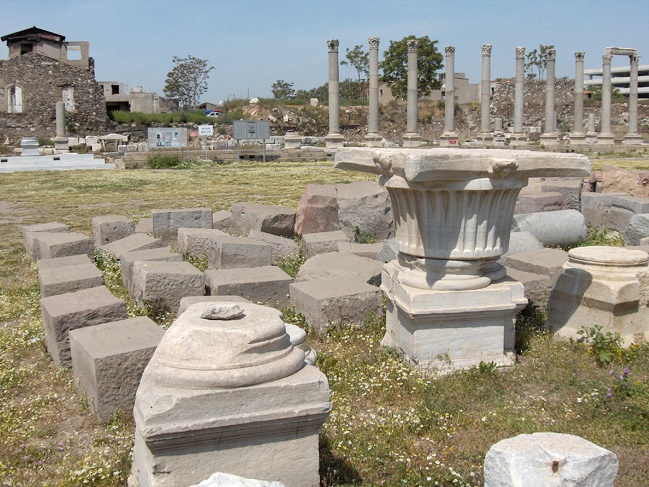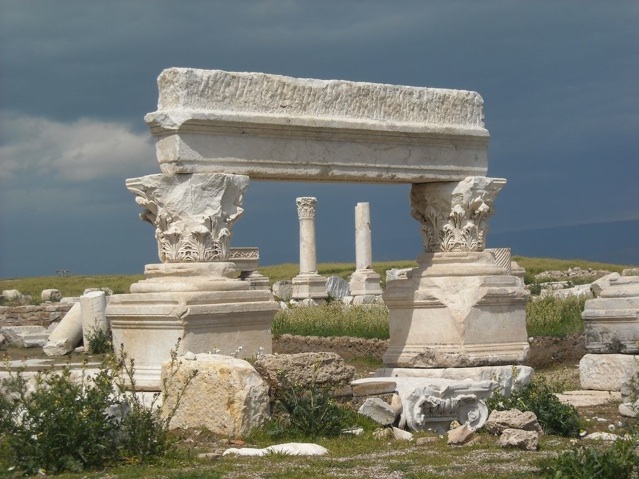Revelation - Part 1
Fall 2011
Lesson 1: overview
-
•Verses in the Gospels that mention John: Matthew 4:21; Luke 5:10; Mark 3:17; Mark 5:36-38; Luke 8:51; Matthew 17:1-3; Mark 9:2; Luke 9:28; Mark 9:38; Luke 9:49; Luke 9:53-56; Mark 10:35-41; Mark 13:3-6; Luke 22:7-9; John 13:21-24; Mark 14:32-34; John 19:26; John 20:1-9; John 21:6-8; John 21:19-21.
-
•Verses in Acts and Galatians: Acts 1:13; Acts 3:1; Acts 4:1-30; Acts 8:14; Acts 12:2; Acts 13:5; Acts 13:13; Galations 2:9.
-
•Domitian, who persecuted the church.
-
•The Island of Patmos (wikipedia): a dry and rocky place. Below is a picture of the only sandy beach on the island.
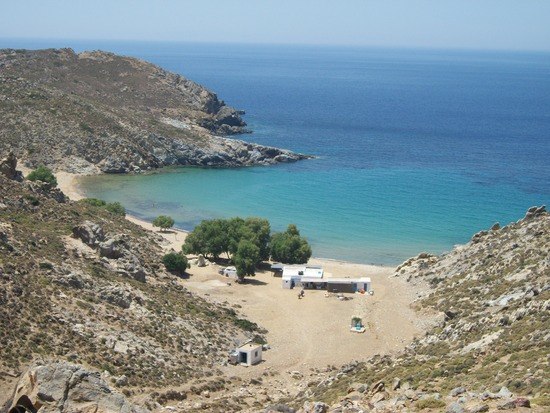
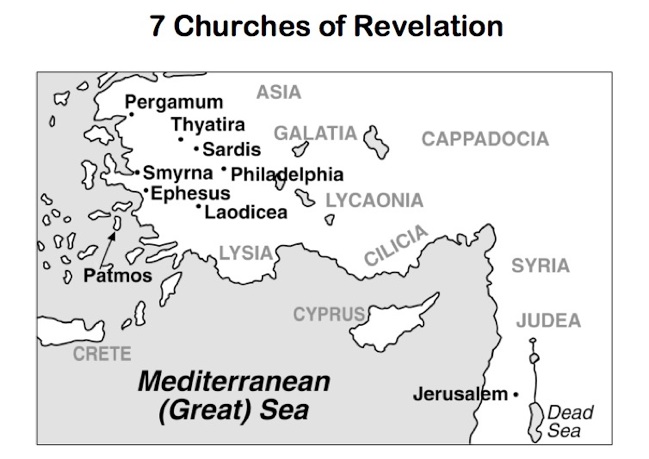
Study on Revelation 1-3: the letters to the churches
Lesson 2
-
•Revelation 1:1-3 and 22:6:8, side by side.
-
•Word studies:
-
•Defintions:
-
•The 7 Spirits: Revelation 1:4, 3:1, 4:5, 5:6, and Isaiah 11:1-2.
Lesson 3: Ephesus
-
•Revelation 1-3: overview
-
•Revelation 2:1-7: letter to the church in Ephesus
-
•Revelation 2:5, expanded, with verb tenses (NKJV). Click on the 'C' beside each verse to expand a verse into a Greek word-by-word transliteration. The KJV and NKJV include verb tenses. The NASB does not.
-
•Cross references for Day 3: Mark 12:28-34, 1 John 5:1-3, Joh 15:10, 1 John 2:15-16, James 4:4, Ezekiel 6:9, 1 Cor 10:11, Rom 15:4, and 1 Cor 13:1-13.
-
•Cross references for Day 5: Acts 2:41-47, Acts 4:32-35 Acts 5:27-42
Lesson 4: Smyrna
-
•Day one
-
•Revelation 1-2:11: overview
-
•Day two and three
-
•Question 7, Hades: Acts 2:22-32; Luke 16:19-31; Rev. 20:13-14
-
•Question 8, keys: Rev. 1:17-18; Isaiah 22:20-23; Rev 3:7
-
•Day four
-
•Question 1: tribulation and poverty in Rev 2:9-10.
-
•Question 2: Revelation 1
-
•Question 3: 2 Cor 8:9; Matt. 6:19-34
-
•Question 6: John 15:18-21; 2 Tim 3:12; Heb 2:10; Heb 5:8; 1 Peter 2:20-21; 1 Peter 1:6-7; 1 Peter 4:12-14
-
•Question 8: Heb 10:32-36
-
•Day five
-
•Other resources
-
•Polycarp's letter to the Phillipians Polycarp was martyred in Smyrna in 155AD, and was one of the last students of John the Apostle. He wrote this letter to the Phillipians. It quotes a lot of the New Testatment: Paul's letters, and the Gospels, calling it Scripture. Note what Polycarp says about the love of money, and consider how that relates to Revelation 2:8-11.
Lesson 5: Pergamum
-
•General resources
Pergamum (wikipedia) Pergamum altar to Zeus, like a throne.
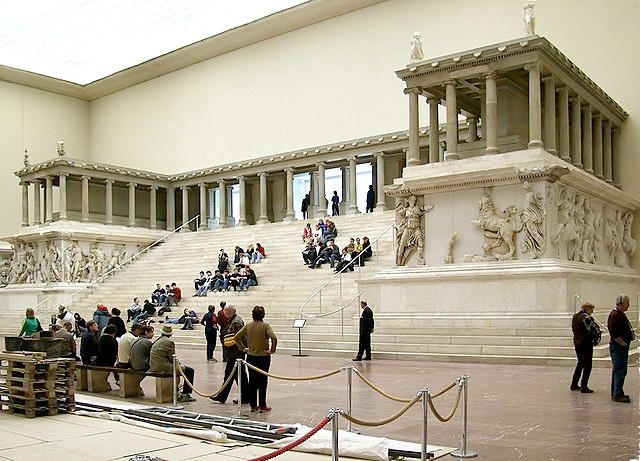
-
•Day one
-
•Rev 1:16, Heb 4:12, Eph 6:17, Rev 19:15, Isaiah 11:4 : the sword from His mouth
-
•rhomphaia: a large sword. properly a long Thracian javelin (which can be thrown), also a kind of long sword typically worn on the right shoulder. It totaled about 5 feet high, the handle was a pole that was much shorter than the blade. The following picture is for a single-edged rhomphaia:

wikipedia article on the Rhomphaia
-
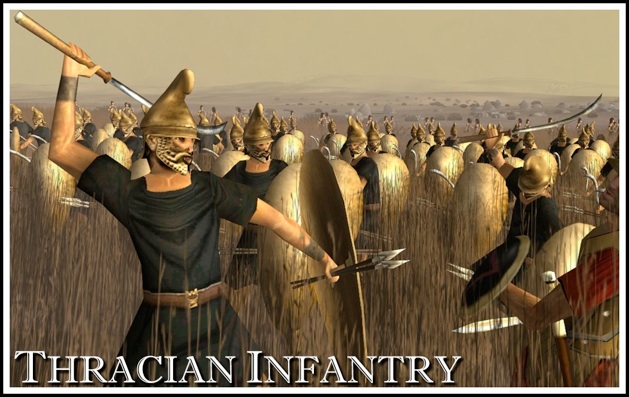
Thracian infantry with rhomphaia (above)
When Plutarch described the Macedonian army he made note of the fearsome appearance of their Thracian allies:
"First marched the Thracians, who, he himself tells us, inspired him with most terror; they were of great stature, with bright and glittering shields and black frocks under them, their legs armed with greaves, and they brandished, as they moved, straight and heavily-ironed spears over their right shoulders."
rhomphaia is used just two books in the NT: Luke (once, in 2:35), and 6 times in Revelation. Five of those refer to the sword from His mouth. The other is the sword of the ashen horse in Revelation 6:8. -
-
machaiara a short sword or large knife. This is the common word for sword in the New Testatment. It appears twice in Revelation (6:4 and 13:10), but never for the sword from His mouth. It is used for the sword of the red horse, and for those killed by the sword of man. The machaiara was a small sword that was not meant to be thrown. makhaira : this is not used for the sword from His mouth in Revelation.
-
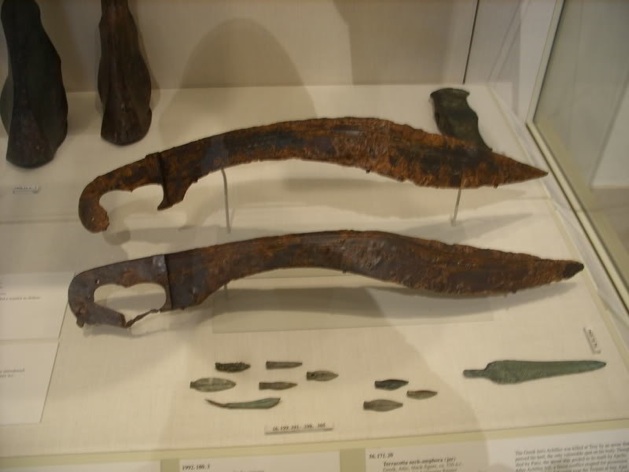
-
•Day two
-
•Psalm 138:2-3; Isaiah 9:6; Matthew 1:21-23; Philipians 2:9-11; Acts 4:12
-
•Day three
-
•Jude 1:3-4; 2 Peter 1:20-21, 3:1-2; 2 Tim 3:16; Matt 5:17-19; Luke 24:25-27; Revelation 22:18-20
-
•Day four
-
•Numbers 22:1-25; 31:16-18; Psalm 106:28-31; Acts 15:22-29; Jude 1:10-16; Colossians 3:5
-
•Day five
-
•Nicolaitans (blueletterbible)
-
•Rev 1:6; 1 Tim 2:5 Heb 4:14-16; 10:19-22; Heb 13:7-9,17; 1 Tim 5:17
Lesson 8: Philadelphia
-
•General resources
-
•ancient Philadelphia (wikipedia)
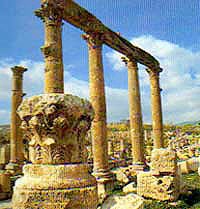
-
•Day one
-
•Revelation 3:7-13: the letter to the church a Philadelphia
-
•Question 3: Philadelphia (the city), and philadelphia (the related word).
-
•Question 5: holy (hagios)
-
•Day two
-
•Question 2: Revelation 3:7, Isaiah 22:22
-
•Question 4: Jeremiah 23:5-6, 33:14-22, Luke 1:30-33, 19:11-27
-
•Question 5: Revelation 5:5, 22:16
-
•Question 6: Revelation 1:5, 1:18, Matthew 28:18, John 5:21, 26-29
-
•Day three
-
•Question 1: Revelation 3:8-9
-
•Question 4: Revelation 3:7, John 8:44, John 8:37-47
-
•Additional information for question 4: The half-truths of Satan
-
•Day four
-
•Question 2: testing (peirasmos)
-
•Additional information on related Hebrew words, sometimes translated 'test' but not the same as the Greek word peirasmos:
-
•Question 3: Revelation 6:10, 8:13, 11:10, 13:8, 14, 17:8
-
•Day five
-
•Question 1: Luke 21:34-36
-
•Question 2: from (ek)
-
•Question 2: John 17:15, 12:27
Lesson 6: Thyatira
-
•General resources
-
•Revelation 2 (BlueLetterBible)
-
•A relevant article on today's culture: Why Young Christians Aren't Waiting Anymore
-
•Thyatira (wikipedia)
-
•Day one and two
-
•1 Kings 16:29-33; 1 Kings 18:4, 13, 19; 1 Kings 19:1-3; 1 Kings 21:23-26; 2 Kings 9:22, 30-37
-
•Day three
-
•Day four
-
•Question 1: Rev 2:21-23; Romans 2:22; Psalm 73:1-20
-
•Question 2: Hebrews 13:4; 1 Cor 6:18; Rom 1:26-27; Prov 6:32-35, 7:7, 10, 21-27; 1 Thess 4:3-6
-
•For question 2, see also Psalm 49
-
•Day five
Lesson 7: Sardis
-
•General resources
-
•the gymnasium at Sardis
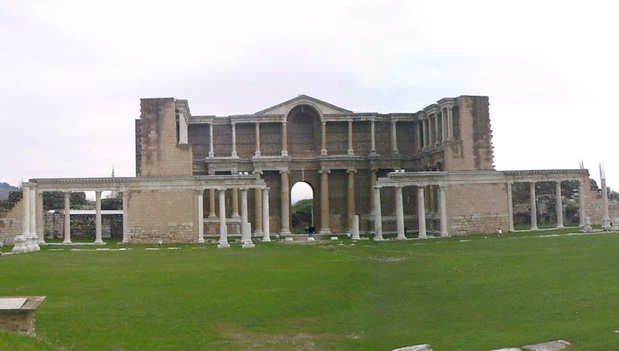
-
•Sardis synagogue
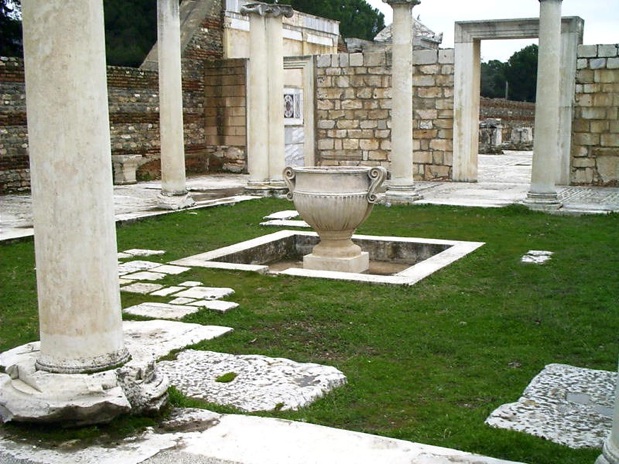
-
•Sardis (wikipedia)
-
•Sardis (BiblePlaces.com)
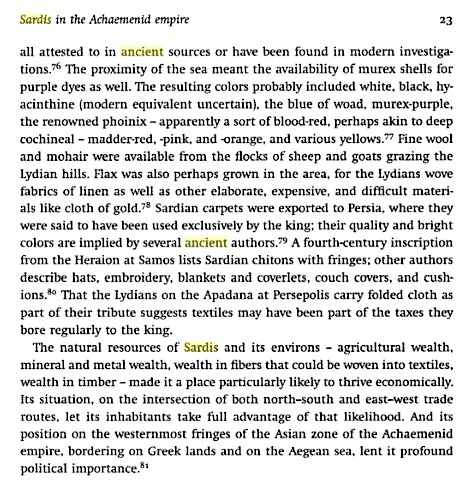
-
•Day one
-
•'come' or 'coming' in Revelation 1-3
-
•Day two
-
•Question 4: the 7 Spirits of God: Revelation 1:4, 4:5, 5:6, Zechariah 4:1-14, Proverbs 15:3, Isaiah 11:1-5
-
•Day three
-
•Question 2: John 1:11-13, 10:10, 14:6; Romans 8:1-2, 9-11; John 6:63, Ephesians 1:13, 2:1-5
-
•Question 3: Hebrews 3:6, 12-14; 1 Corinthians 15:1-2
-
•Day four
-
•Question 1: deeds (ergon)
-
•Question 1: completed (plēroō)
-
•Question 2: ergon (deeds) in Revelation 2-3
-
•Question 3: Ephesians 2:8-10; Titus 3:5-8; James 2:14-26
-
•Question 4: Revelation 3:1-6; Matthew 7:21-27; Ephesians 2:8-10;
-
•For faith / works, see also
-
•'aman: to believe / to have faith (Hebrew)
-
•pisteuo: to believe / to have faith (Greek)
-
•pistis: faith
-
•Day five
-
•Question 3: Luke 12:35-40, Matthew 24:42-51, 25:1-30
-
•Question 5: Revelation 6:9-11, 7:9, 11-14, 16:15, 19:7-8, 14
Lesson 10: overcomers
-
•Day one and two
-
•Question 1:
-
•see the related nouns nikē
-
•and nikos
-
•see also hypernikaō
-
•Day four
-
•Question 1: Revelation 2:7, Genesis 3:22-24, Revelation 22:1-2,14,19
-
•Question 2: Revelation 20:6, 14-15, Revelation 21:8
-
•Question 3: Revelation 2:17, Exodus 16:13-15,26-35, Hebrews 9:1-5, Deut 8:3, John 6:31-40, 48-51, Revelation 19:7-9
-
•Question 4a: Revelation 2:26-27, Psalm 2, Luke 19:11-19, Revelation 5:10, 3:21
-
•Question 4b: Daniel 12:1-4, Matthew 13:43, 2 Peter 1:19, Revelation 22:16
-
•Day five
-
•Question 1: Revelation 3:5, 13:1-9, 17:8, 20:12,15, 21:27, Psalm 69:19, 22-28, Matthew 10:32-33, Luke 12:8-9
-
•Question 2: Revelation 3:12, 21:1-7, 10,22, Ephesians 2:19-22, 1 Peter 2:4-10, Revelation 19:12, 14:1
-
•Question 3: Revelation 3:21, Matthew 19:28, 25:31, 1 Corinthians 6:2-3, Revelation 5:10, 20:6, 2:26-27
Lesson 9: Laodicea
-
•General resources
hot springs near Laodicea : Laodicea's water supply was from a hot springs several kilometers away, in Hierapolis. The water would arrive lukewarm :
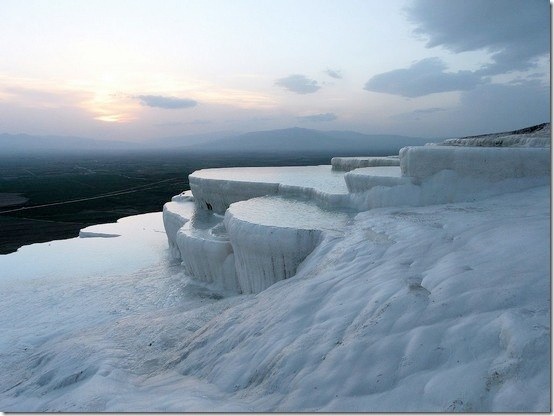
necropolis at nearby Hierapolis, where the water supply of Laodicea originates. Many people were buried at Heirapolis, because they would come to the hot springs for medical treatments, and many of them would retire or die there:
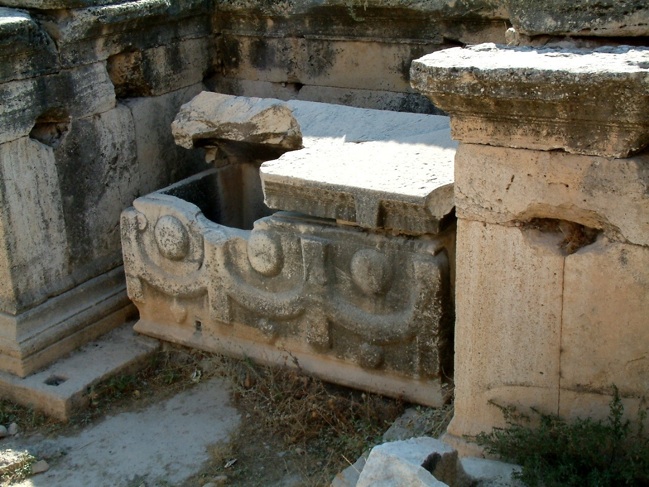
-
•Day one
-
•Revelation 3:14-22: letter to Laodicea
-
•Day three
-
•Question 1:
-
•amen
-
•Question 2: witness (martys)
-
•Question 3: John 1:18, 14:8-12, 8:28-29, 5:19, 30
-
•Question 4: Revelation 1:2, 19:9, 11, 21:5, 22:6, 22:16, 22:18
-
•Question 6:
-
•Question 7: 2 Corinthians 13:5, 1 John 2:19, Matthew 7:15-23
-
•Day four and five
-
•Question 2:
-
•Question 3: pitied / miserable
-
•Question 4: poor
-
•Question 4c: 1 Peter 1:6-9; Psalm 66:8-12
-
•Question 4d: Isaiah 55:1-3, Revelation 22:17
-
•Question 5: Matthew 23:16-19, 2 Corinthians 4:3-6, John 9:1,6-7,17-31,39
-
•Question 6: Revelation 6:11, 7:9, 19:8, 16:15
-
•Question 7: Matthew 22:1-14, Revelation 19:9
-
•Question 8: Revelation 3:14-22
-
•Question 9: Revelation 3:20
